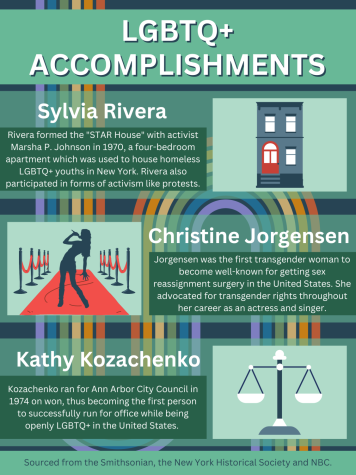Educating about being targeted for existing
April 24, 2023
While certainly vast in range, these examples of discrimination are nothing but a small look into the daily struggles LGBTQ+ people face. Discrimination, harassment and hate crimes all affect higher mental illness rates among LGBTQ+ teens. However, these truths should not just be silently accepted. To allow every person to reach their full potential, regardless of gender or sexuality, we must work toward cultivating an inclusive environment.
“I honestly think that [anti-LGBTQ+ people] are closed-minded. Everybody was born to live their own life, and their sexual preference shouldn’t matter because it’s not [those people’s] lives,” Jenkins said.

School curricula should accurately reflect the struggles that LGBTQ+ people have overcome and are currently facing. LGBTQ+ people play a large role in history worldwide, whether it be famous historical figures who happened to be LGBTQ+ or LGBTQ+ activists who fought for change. Even just acknowledging the work LGBTQ+ people have done contributes widely to feelings of belonging among LGBTQ+ students, who may have never seen themselves represented in history otherwise.
Educational settings such as health classes must also make a strong effort to provide education applicable to everyone, not just cisgender or heterosexual students. This education would most importantly include information about all sexualities and gender identities as well as available resources for those who are questioning or experiencing mental health issues in relation to identity. With mental illness being much higher among LGBTQ+ teens, it is imperative that we provide students with the proper resources to access help and information.
“It would be amazing if we talk more about the history of queer individuals. Trans people, gay people, queer people; it’s not new. It hasn’t been new. It’s been around for years. The newer thing is being against queer people,” Herring said. “Be nice to queer people. They’re people like us. We’re all humans; no matter who we love or how we identify, we’re just people trying to figure out our lives.”
Additionally, we must educate ourselves about LGBTQ+ history and work to undo our preconceived notions about the LGBTQ+ community, which have been born from existing in a heteronormative society. For far too long, these biases and subsequent hateful actions have been brushed under the rug, ignored by those who have little care for the LGBTQ+ community.
“As far as school, I have faced discrimination. I’ve had people call me different slurs or different names. I’ve had people try to out me. I’ve never been secretive about my identity; if someone knows I’m trans, that’s fine. But I don’t like when people try to out me because it makes it seem like I’m ashamed of who I am when really I love who I am. I love being a trans woman,” Herring said.
Viewing LGBTQ+ people in a hateful manner continues ostracization that has gone on for far too long. If we as a society want to truly reach a stage in which every person is accepted and holds a sense of belonging, we must actively work to create change within both our communities and our minds — we have to stop targeting people for existing. It is not wrong or “sinful” to be LGBTQ+; it’s human.
